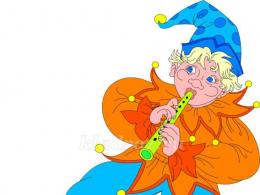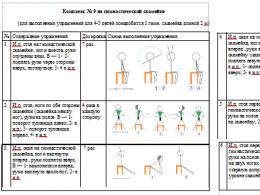Does the limit u. Is there a limit to the physical capabilities of a person. Limit of a function - basic concepts
She got married early, at the age of 18. Before that, they had been dating for 3 years. Relations were not cloudless, there was friction, difficulties, parting, reconciliation. But we decided to be together. The relationship continued to be difficult, I can’t praise myself, I behaved like a child: capricious, demanding, fancied myself a victim in some situations, although now I understand that there was not enough understanding, wisdom and just love in our relationship. We were not ready for an independent, adult life, we set foot on a path that was too difficult for us at that time. The income was minimal, money was sorely lacking, especially with the birth of our first child a year later.
My husband decided to go to work, got a job, three months later we moved to his rented apartment. 3 months were very happy. Then difficulties arose, I had to move to a house without amenities, my nerves were at the limit, I understand my husband now, who had a hard time on the site. In one of the quarrels, she received her first slap in the face.
For 7 years we wandered around rented apartments. There were a lot of things. In the desire to provide for the family, the husband stopped choosing work too morally. Then he began to disappear for days, began to drink, take walks. He hit me hard a couple of times. Then he asked for forgiveness. Everything changed for a while, then a new one: partying, drinking, slot machines, six months in prison. A promise that things will be different. A punch in the face on the first day out of jail. I stubbornly did not want to see a monster in a loved one. She capriciously demanded to change her life, not realizing that the roots were hidden an order of magnitude deeper. Periodic quarrels, reconciliations, calms, storms. There was a lot.
Why didn't you leave? I tried, but my mind refused to see him as a stranger. He was native to stupidity. So vicious and affectionate, a beast and a kitten, an angel and a demon. I could not get away from him, it was pain, strong, but mine, dear pain. If I still understood that tantrums and screams cannot achieve love and reciprocity ... I, like a blind kitten, rushed through life in a cage, the site not knowing where to put myself.
He received his second prison term last year for theft. This was a blow to me. The very thought that the father of my children was a thief was humiliating. I couldn't deal with it. Then she calmed down and talked on the phone. It seems like they decided that we would try to restore our family life - he is a wonderful father. Then he disappeared for 2 months. When sent to another camp, it was not possible to communicate.
And I fell in love like a girl, like a child, despite my 30 years. I don’t like the character of that person, I’m not delighted with his appearance, besides, he is married a second time and there is no hope of being together and I don’t want to. We can't be together. I don’t want to destroy his family, and we are too different people, and I don’t want my children to grow up with a stepfather when they have a father. There were several meetings with a person who appeared in my life. I have never had this. Feelings at the level of smell, feel. Some kind of deep attraction, the desire for him to be happy, the site, if not with me, but to be. Happiness is just from his smile. I doubt he felt the same about everything.
He took the first steps towards rapprochement, I did not refuse, because at first glance I realized that this person would be with me, as if I had known him for a hundred years. I didn't want a serious relationship. I just wanted to be a little happy. These relationships do not have a clear beginning and end. We do not meet now, what will happen next, I do not know.
The husband is back. I wanted to get a divorce so that everything was fair. He stopped me, explained that he understood a lot, that we meant a lot to him. He proved his words by giving up drugs (he got hooked in prison, it turns out, it happens like that). He has not used drugs for several months (someone will now think that this is not an indicator - I myself know, I worry about this), got a job, however, far from us, trying to send us money. And he promises that everything will work out for us and everything will be fine. I believe, I believe in his desire, I believe that everything will be fine, only the feelings are no longer the same site and the heart beats in a completely different way. Time will determine everything in its place, I don't want to live a lie and I don't want to hurt anyone. I just want to be happy, love and be loved.
My family is very important to me, the happiness of my children, who are crazy about dad, is important. And for me, he is in any case a dear and close person. Good father, wonderful lover. I ask God for only one thing - to give him the strength not to return to drugs, a life of crime. I really need you, you are important. You are my own person!
How fast can a person run? How high and how far can he jump? And is there a limit to the physical capabilities of a person at all, or will the results grow indefinitely?
One of the first to think about this question was the California coach Bruce Hamilton, who in 1934 acted as a predictor of the limit records in athletics. In his opinion, a person will never jump above the line of 2 meters 11 centimeters, and in the 100-meter run, the highest result will be 10.1 seconds. A greater load, according to Hamilton, human muscles are simply not able to withstand.
At that time, the world records of athletes could be considered close to the limit: in the 100-meter race, the American R. Metcalf was the record holder with a score of 10.3 seconds, and the result of the best high jumper was 2 meters 6 centimeters. W. Martney from the USA was able to overcome such a bar. This means that sprinters could add another 0.2 seconds, and jumpers - 5 centimeters. And that's it - will the records end there? Nothing like that, in a few years all Hamilton's predictions collapsed.
In the late eighties, physiologists named new milestones: 100-meter run - 9.58 seconds, high jump - 2 meters 56 centimeters, long jump - 10 meters 33 centimeters. But for the marathon runners, the bar was set at 1 hour 58 minutes and 22 seconds.
Another 30 years have passed, and what do we see? The world record in the 100 meters, set by the legendary Usain Bolt, exactly repeats the forecast of scientists: at the tournament in Berlin on August 16, 2009, he showed just such a result - 9.58 seconds. It turns out that this was the last world record in the hundred meters?
A few years ago, John Brenkus, the host of Sports Science, said that the results in this discipline will grow for a very long time. And he even made a long-term forecast - by 2909 the best athletes in the world will run a distance faster than 9 seconds. One can only envy the practicality of Brenkus - who will remember his predictions in 900 years?
In marathon running, Brenkus also moved the record bar, according to his calculations, the best marathon runner of all time will be able to cover the distance in 1 hour 57 minutes and 57 seconds. The world record is currently held by Dennis Kimeto of
Kenya - 2 hours 2 minutes 57 seconds. This means that there is still a reserve of exactly 5 minutes.
Jumping is a little more difficult. Here, the records have clearly slowed down, and the results will still grow and grow to the maximum designated bar. For example, back in 1993, the Cuban Javier Sotomayor took the line of 2 meters 45 centimeters, and for a quarter of a century no one can come close to his record.
And in the long jump, Bob Beamon at the 1968 Olympics made, as they said then, a jump into the 21st century, flying 8 meters 90 centimeters. True, the record did not reach the 21st century - in 1991, Mike Powell reached the milestone of 8 meters 95 centimeters. And that's it, no one can jump further for 27 years. It is interesting that athletes who showed results close to Powell's achievement ended their careers long ago.
Canadian biologists challenged last year's statement by US scientists that there is a limit to human life - 115 years. They put forward the assumption that people will live much longer than expected by American scientists.
In 2016, scientists from the Albert Einstein College of Medicine in New York found that despite the fact that human life expectancy has doubled in the last century, the maximum human age does not change. Geneticists Jan Weig, Brandon Milholland, and Xiao Dong worked with the Human mortality database and found a statistical limit of about 115 years for human life.
According to the study, it turned out that, despite the constant increase in life expectancy throughout the twentieth century, the number of people who died at the age of about 110 years has not changed since the late 60s of the XX century. The oldest person on record, Frenchwoman Jeanne Calment, died in 1997 at the age of 122, but this is an exception. Jan Weig and his colleagues concluded, based on the processing of statistical data, that the chance to live to 125 years is only 1 in 10,000. The scientist explained his findings by the fact that by the age of 100-110 years, irreversible "wear and tear" of all organs occurs, therefore, to prolong life a person beyond this threshold, according to Veig, is not possible.
Hekimi vs Veig
However, Canadian scientists re-analyzed changes in human life expectancy over the past 50 years and concluded that humanity has not yet reached the limit of life.
“It is very difficult to predict how long people will live in the distant future if this limit does not exist. Three hundred years ago, many people lived extremely short lives by modern standards. If someone had told them that one day their descendants could live 100 years, they would have thought we were crazy,” said Siegfried Hekimi of McGill University in Montreal.
Siegfried Hekimi and colleagues reanalyzed the life expectancy statistics for the longest-lived people in the US, UK, France, and Japan from 1968 to today. They used the same technique as Jan Weig: they were not interested in the number of deaths of people at a certain age, but where the most noticeable decline in the number of dead people occurs when comparing data from earlier and later years. If there is no limit to life, then this “survival point”, as scientists call it, will move towards an older age. If the limit of life exists, then this point will stop at a certain moment and will not move further.

Hekimi noted that the number of centenarians who were selected for analysis by American biologists was too small for unambiguous conclusions, moreover, for some reason they divided the group into two time periods - before 1994 and after. Hekimi and colleagues expanded the data set and analyzed it in its entirety without dividing it into segments. The analysis showed that the growth of both average and maximum life expectancy did not stop during this time., which means that American scientists have discovered not the limit of life, but only traces of fluctuations (fluctuations) in the maximum life expectancy.
Hekimi and his colleagues found a similar fluctuation in the time period from 1968 to 1980, when the maximum life expectancy also remained the same or even fell, as in the last two decades. Accordingly, we can say that we have not yet reached the limit of life, or that it does not exist in principle, the scientists conclude.
But there are disagreements
The authors of the discovery of the "limit of life" have already expressed disagreement with the conclusions of Hekimi. They believe that their opponents use the wrong methods of analysis and incorrectly believe that statistics on maximum life expectancy obey the same mathematical rules as sets of completely random values. Therefore, according to Jan Weig and his colleagues from New York University, their conclusions remain correct, and Hekimi's criticism remains unaddressed and incorrect.
Note that Weig's concept of the limit of life has been criticized before: California scientists working on "immortality pills" believe that genetic engineering can extend life indefinitely. The famous gerontologist Aubrey de Gray has long argued in his writings that a person can live up to a thousand years, and we are talking about someone who has now reached maturity. De Gray believes that the authors of the work on the age of 115 as the limit of life take into account only the achievements of medicine of yesterday and maybe even today, but does not think about the future.
Other opponents of Veig and his team say it is still possible to work with aging at the cellular level. For example, Thomas Kirkwood of the University of Newcastle believes that aging is a process that is controlled by the accumulation of errors and damage in cells and organs, and this process can be slowed down and compensated to some extent. In this case, however, we are talking only about a slight excess of the maximum life span.
“What we observe is not nature in itself, but nature presented to our method of observation,” wrote the German physicist Werner Heisenberg, who was the first to understand the uncertainty inherent in quantum physics. For those who see science as a direct path to the truth of the world, this quote may be unexpected or even disappointing.
So Heisenberg believed that our scientific theories depend on us as observers? Does this mean that the so-called scientific truth is nothing more than a big illusion?
You might be quick to argue: why then do planes fly and antibiotics work? Why are we able to create machines that process information with such amazing efficiency? Of course, such inventions and many others are based on the laws of nature that function independently of us. There is order in the universe, and science is gradually revealing it.
Yes, this is undoubted: there is order in the universe, and the task of science is to find its patterns and patterns, from quarks and mammals to entire galaxies, to determine them by general laws. We eliminate unnecessary complexity and focus on the essence, on the main properties of the system we are studying. Then we create a descriptive narrative of the system's behavior, which, at best, is also easily predictable.
It is often overlooked in the heat of research that the methodology of science requires interaction with the system under study. We observe its behavior, measure its properties, create mathematical or conceptual models to better understand it. To do this, we need tools that are beyond our sensitive range: to study the smallest, fastest, most distant and practically unreachable, like the interior of our brain or the core of the Earth. We are not observing nature itself, but nature reflected in the data we collect with our machines. In turn, the scientific view of the world depends on the information that we can get with our tools. And assuming that our tools are limited, our view of the world will definitely be shortsighted. We can only see into the nature of things up to a point, and our ever-changing view of the world reflects a fundamental limitation in how we perceive reality.
Suffice it to recall what biology was like before the advent of microscopes or gene sequencing and what astronomy was like before the advent of telescopes, particle physics before the collision of atoms in colliders and the advent of fast electronics. Now, as in the 17th century, the theories we create and our view of the world change as our research tools change. This trend is a hallmark of science.
Sometimes people take this statement about the limitations of scientific knowledge as defeatist. "If we can't get to the bottom of things, why try?" But this is the wrong approach. There is nothing defeatist in understanding the limitations of the scientific approach to knowledge. Science remains our best methodology for building consensus about the principles of nature. Only the feeling of scientific triumphalism changes - the conviction that no question will remain beyond the scope of scientific understanding.
There will definitely be unknowns in science that we will not be able to solve by accepting the existing laws of nature. For example, a multiple universe: the assumption that our universe is just one of many others, each with its own set of laws of nature. Other universes lie outside our causal horizon, we will never receive a signal from them and we will not send our own. Any evidence of their existence will be indirect: for example, a trace in the microwave background of space left after a collision with a neighboring universe.
Other examples of the fundamentally unknowable can be identified by three questions about the origin: the universe, life, and mind. Scientific representations of the origin of the universe will be incomplete because they rely on conceptual frameworks: conservation of energy, relativity, quantum physics, and others. Why does the universe operate according to these laws and not according to others?
Similarly, unless we can prove that there is only one of several biochemical pathways that create life from non-life, we will not be able to know exactly how life on Earth began. In the case of consciousness, the problem lies in jumping from the material to the subjective - for example, from the activation of neurons to the sensation of pain or red. Perhaps some rudimentary consciousness could arise in a fairly complex machine. But how can we know? How do we determine—rather than assume—that something is conscious?
Paradoxically, it is our consciousness that endows the world with meaning, even if this semantic picture is imperfect. Can we fully understand what we are a part of? Like the mythical snake that bites its own tail, we are stuck in a circle that begins and ends with our experience of life in this world. We cannot separate our descriptions of reality from how we experience that reality. This is the playing field on which the game of science unfolds, and if we play by the rules, we can only see a fraction of what lies beyond this field.






